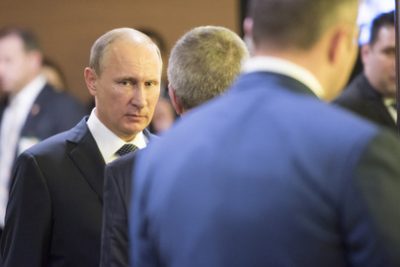Social Media War Hype: Apocalypse Now or Apocalypse Never?

The following is the article-amended version of Andrew Korybko’s Facebook post on why the hype about “World War III” is overblown and unfounded.
Many people on Facebook have fallen victim to the collective psychosis that’s sweeping social media and being pushed by the sensory overload (and a bit of emotive manipulation, if one may dare say) experienced by so many news updates about Syria at one time.
The latest one alleges that the Russian Ambassador to Lebanon said the following:
““If there is a strike by the Americans, then…the missiles will be downed and even the sources from which the missiles were fired,” Zasypkin told Hezbollah’s al-Manar TV, speaking in Arabic. He also said a clash “should be ruled out and therefore we are ready to hold negotiations”.”
This was preceded by, in the case of Reuters, reminding everyone that he was also referencing this:
“The Russian military said on March 13 that it would respond to any U.S. strike on Syria, targeting any missiles and launchers involved in such an attack. Russia is Syrian President Bashar al-Assad’s most powerful ally.”
Notice that every “report” on his comments, which were said last night and aren’t “breaking news” this morning, include ellipses that leave out the middle part of his statement, and some don’t even include that he was referring to the 13 March declaration.
Well, what exactly is that, many might be wondering?
Here’s what Sputnik reported:
“Russian armed forces will respond if the lives of Russian servicemen in Syria are threatened, including in the event of a missile strike on Damascus, the Russian General Staff said.”
What this means is that the Russian Ambassador to Lebanon was just reiterating what has been said before, except the contemporary context leads one to think that it’s something new and is referring to any US missiles without exception, which isn’t true.
Like the author wrote in his latest article on the topic, “The Suspicious Timing Of The Latest Provocations In Syria“:
“First Deputy Chairman of the Federation Council’s Committee on International Affairs Vladimir Jabarov made it clear last year when Trump first bombed Syria that “Russia has no intentions to use its Aerospace Forces against US missiles if Washington decides to carry out new strikes in Syria as it could lead to a large-scale war”. Bearing this in mind and reassessing what just happened, “Israel’s” feeble strike this morning can be read as a “test run” for identifying the true strength of Syria’s air defense units and to ensure that Moscow won’t interfere so long as “deconfliction mechanisms” are successfully employed to guarantee the safety of its Syrian-based servicemen, thus avoiding the “tripwire” that would necessitate a Russian military response no matter what.”
Altogether, Russia will not shoot down just any US missiles, but only those that threaten its servicemen, which didn’t happen last year when Trump let off his cruise missile salvo nor earlier this week when “Israel” hit Syria for the umpteenth time. The so-called “deconfliction mechanisms” work, that’s a fact, and everything that is hitting the media now is just for public consumption, nothing more, nothing less.
The US and its allies are likely using that aforesaid “mechanism” right now to coordinate their upcoming strike, just as they purportedly did before. Any supposed Russian “response” would likely be “superficial” and not “substantial” in the sense that it wouldn’t be geared towards setting off World War III, for better or for “worse” (with the latter being in reference to some apocalypse-obsessed Alt-Media folks).
Don’t fall for Alt-Media dogma and think that the world is about to end — it’s not, though there are some who want their audiences to think that for reasons that only they can account for when and if they’re publicly challenged. As a closing reference, any interested readers are welcome to check out the author’s analysis about “Alt-Media: Debunking The Dogma”.
*
Andrew Korybko is an American Moscow-based political analyst specializing in the relationship between the US strategy in Afro-Eurasia, China’s One Belt One Road global vision of New Silk Road connectivity, and Hybrid Warfare. He is a frequent contributor to Global Research.
 “Towards a World War III Scenario: The Dangers of Nuclear War”
“Towards a World War III Scenario: The Dangers of Nuclear War”
by Michel Chossudovsky
Available to order from Global Research!
ISBN Number: 978-0-9737147-5-3
Year: 2012
Pages: 102
Print Edition: $10.25 (+ shipping and handling)
PDF Edition: $6.50 (sent directly to your email account!)
Michel Chossudovsky is Professor of Economics at the University of Ottawa and Director of the Centre for Research on Globalization (CRG), which hosts the critically acclaimed website www.globalresearch.ca . He is a contributor to the Encyclopedia Britannica. His writings have been translated into more than 20 languages.
Reviews
“This book is a ‘must’ resource – a richly documented and systematic diagnosis of the supremely pathological geo-strategic planning of US wars since ‘9-11’ against non-nuclear countries to seize their oil fields and resources under cover of ‘freedom and democracy’.”
–John McMurtry, Professor of Philosophy, Guelph University
“In a world where engineered, pre-emptive, or more fashionably “humanitarian” wars of aggression have become the norm, this challenging book may be our final wake-up call.”
-Denis Halliday, Former Assistant Secretary General of the United Nations
Michel Chossudovsky exposes the insanity of our privatized war machine. Iran is being targeted with nuclear weapons as part of a war agenda built on distortions and lies for the purpose of private profit. The real aims are oil, financial hegemony and global control. The price could be nuclear holocaust. When weapons become the hottest export of the world’s only superpower, and diplomats work as salesmen for the defense industry, the whole world is recklessly endangered. If we must have a military, it belongs entirely in the public sector. No one should profit from mass death and destruction.
–Ellen Brown, author of ‘Web of Debt’ and president of the Public Banking Institute


